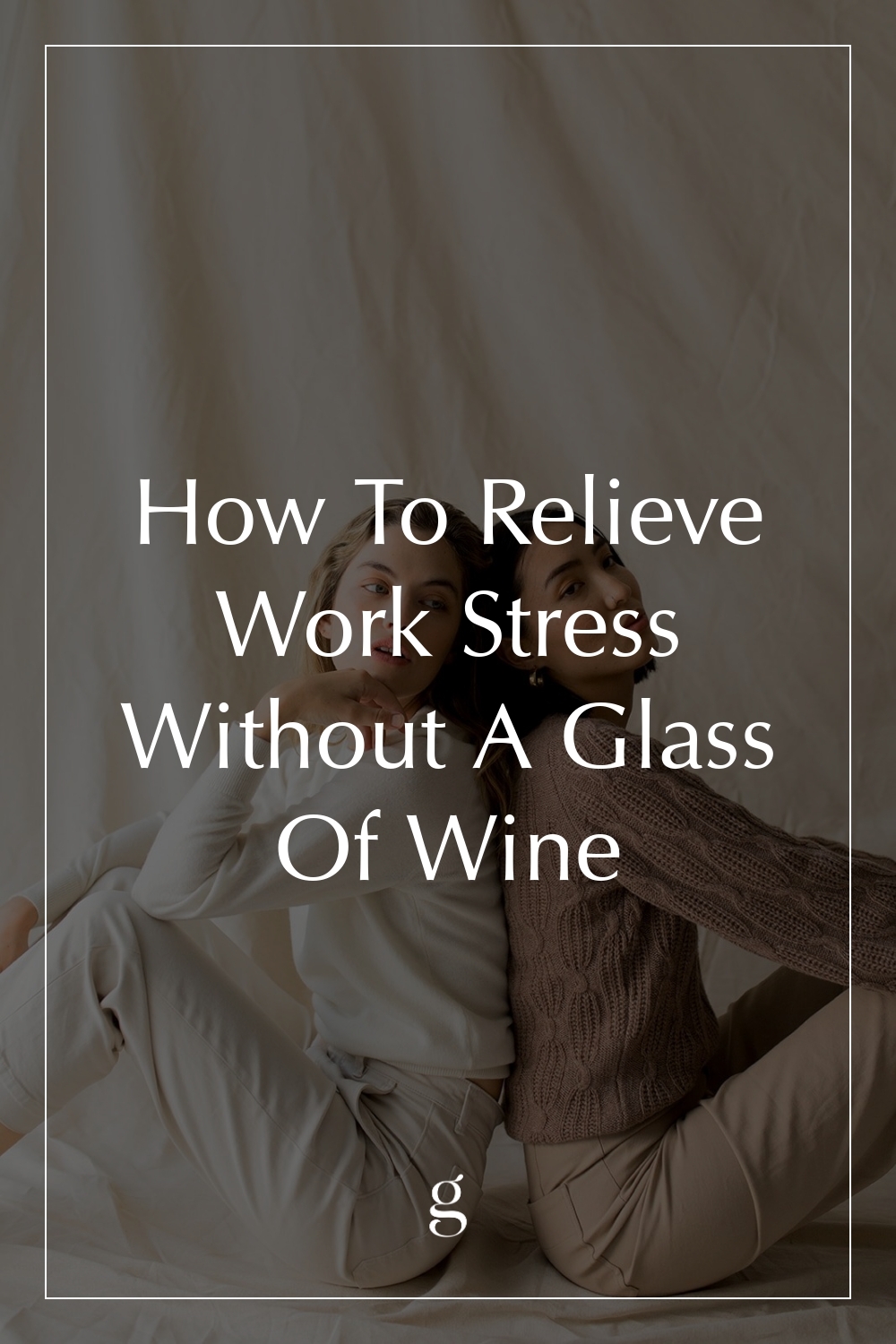
How To Relieve Work Stress Without A Glass Of Wine
Healthier Stress Management
Let me paint a picture for you: you arrive home after a long day at work, set down your bag, and toss your keys into their basket. “What a DAY,” you say to your pet as you give them a little snuggle and scroll for a bit on your phone. As you read the latest political and environmental news, you wander to your kitchen, feeling more exhausted by what you’re reading. Oh, and you’re out of leftovers so it looks like you’ll be making dinner from scratch tonight—maybe yoga won’t happen. Is it time for your post-work, pre-dinner cocktail yet?
“Is it time for your post-work, pre-dinner cocktail yet?”
But did last night’s glass of cabernet actually leave you feeling less stressed today? Relaxing after an overwhelming day shouldn’t involve completely ignoring the root cause of stress. If we’re opting for booze instead of addressing our emotions on a regular basis, the only winner is the Ibuprofen in our medicine cabinet.
“Using alcohol to cope with stress is a very short term solution,” explains Dr. Jordanna Quinn, D.O., M.S. “While it can feel good and even necessary to grab for a drink after a stressful event, it is not useful in the long run…Alcohol use may also increase depression and anxiety […], which does not help the stressful situation at hand, or help a person cope with the stressful situation.”
What’s more, on a stressful (and less-restrained) day, one glass of wine becomes two—or more—and that early morning routine that you planned becomes less of a reality. Which, if you’re like me, begins a cycle of frustration and even more stress.
So can we chill out without a cold one? Try the below practices before reaching for the booze. Your body (and your wallet) just might thank you.
Start By Planning Ahead
If you want to cut back on your alcohol consumption, one of the most helpful strategies is to plan your evenings. At the beginning of each week, set a schedule for yourself of exactly what you’ll do each evening, from the food you’ll eat to the things you’ll do for self-care. When you have a calendar set out, it’s easier to remind yourself to stay on track. Scheduling out yoga classes, setting up phone dates with long-distance friends and family, and even less-fun tasks—like doing the laundry—can help you stay accountable to yourself each evening.
Exercise
This is so commonly the answer to these questions, and for a good reason. Exercise reduces the stress hormone cortisol, releases endorphins, and improves your sleep. And, because “your body produces stress hormones for about 12 hours after a stressful event,” Dr. Quinn suggests exercise for “dealing with these increased hormones in your body.”
“Small steps are a catalyst for larger habit change.”
Instead of pouring a glass of wine when you get home, go for a walk around the block, or even set the bar as low as “put on your shoes and leave the house.” Those small steps are a catalyst for larger habit change. Getting out of the house also offers you a chance to stretch your eyes and to look at the world around you instead of at a screen.
Exercise is cathartic, but not always accessible. Personally, if I’m not at peak mental wellness, it takes an enormous amount of energy to leave the house (even when I know it’d be good for me). Beyond that, physical, financial, and emotional barriers need to be considered when recommending exercise as the end-all solution to managing stress. Sometimes it’s just not possible, so there needs to be judgment-free space to explore other options.
Play Games
One of the easiest ways to tune out after a long day (aside from snagging a beer) is to flip on Netflix. But I’ve found that being a passive participant in media consumption ends up wasting a massive amount of time and leaves me feeling even more drained.
Instead, opt into a board game or video game. Board games offer a break in screentime and tend to be a more social option, but video games are a more engaging way to sit in front of the television. If you’re looking for the ultimate peace and quiet, light a candle and piece together a jigsaw puzzle.
Take Care Of Yourself
If your body is craving relief, take that as an indication to do a little physical self-maintenance first and foremost. Pour yourself a big glass of water as soon as you get home from work. Cook yourself a hearty meal or bake a delightful dessert and practice mindfulness while you eat. And bathe; it sounds like a given, but when I’m stressed, I always seem to forget how well a warm shower resets my mind.
You can move beyond the basic necessities, too. Painting your nails, exfoliating your skin, applying an elaborate face mask, or even slathering lotion on your hands, elbows, and knees are gentle reminders that you are loved and cared for. For a literal moment of love, having sex with your partner (or yourself) is also good for reducing stress and reconnecting with your body. If you have the time, a short meditation or round of breathwork will calm your mind (you can even practice deep breathing while you’re doing other activities).
“If your body is craving relief, take that as an indication to do a little physical self-maintenance first and foremost.”
Journal
This won’t be for everyone, but journaling keeps your mind (and your hands) occupied when you’re trying to kick a habit. A journal is also an excellent place to record and process the things that have been most stressful each day.
My practice has been to write out the things I’m feeling overwhelmed about, and then to follow each one up with self-forgiving and self-affirming language. For example: if you write, “I don’t feel like I’m progressing at work,” follow it up with, “I am trying my best to move forward each day, and the most important thing I can do this evening is to take exceptional care of myself.” If you’re not sure that writing it out is right for you (or you’ve never tried it), here is a guide to journaling.
Go To Bed Early
In the face of high stress, sometimes we just need to shut it all down for the day. Maybe that means skipping a workout, canceling a phone call, or leaving the kitchen dirty and turning the lights off by 8 PM. Plus, your sleep will be more restful without the booze. Dr. Quinn explains, “Drinking alcohol will interrupt a good night’s sleep. Having restful sleep is more important in recovering from stress than anything else.”
If you’re able to, give yourself permission to put non-critical things off until the morning and go to bed. Sleep and stress are deeply connected, so ensuring that you have plenty of time to rest each night will help prevent stress from spiraling out of control.
“Drinking alcohol will interrupt a good night’s sleep. Having restful sleep is more important in recovering from stress than anything else.”
Many of these suggestions might sound like the perfect pairing with a glass of wine. If you’re trying to avoid it, it’s helpful to have sparkling water or peppermint tea available so that you have something to reach for. If you’re sober curious, here are some more tips to help you create a more mindful approach to alcohol.
Finally, the most important thing is to practice removing the judgment from our behaviors. Guilt and shame aren’t helpful tools when creating new habits. If you wind up “wine-ing down” after a long day when you hadn’t planned to, don’t beat yourself up about it. Instead, get really, really present: focus on the sensory experience of your drink, welcome gratitude for the moment of calm, and enjoy each sip thoughtfully.
What is your go-to sober way to manage work stress? Share in the comments below!
RELATED READING
Emily Torres is the Managing Editor at The Good Trade. She’s a Los Angeles transplant who was born and raised in Indiana, where she studied Creative Writing and Business at Indiana University. You can usually find her reading or writing, caring for her rabbits, or practicing at the yoga studio.


